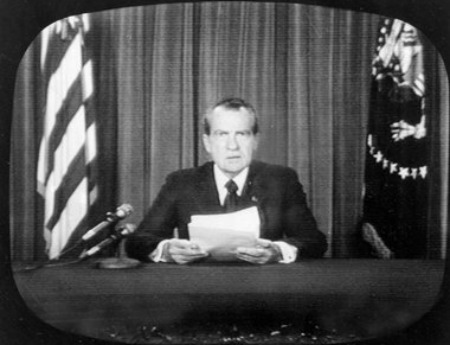Nightmare Revisited

The smarter way to stay on top of broadcasting and cable industry. Sign up below
You are now subscribed
Your newsletter sign-up was successful
I remember exactly where I was on Aug. 8, 1974, when I learned that President Richard Nixon would be resigning. I, who lived just outside of Washington and had been avidly following the unfolding scandal in the Post and on TV and had been glued to noncommercial TV during the Watergate hearings and, well, you get the point. I was listening to the car radio just outside a rented beach house on the Outer Banks of North Carolina where my family had gone on vacation when I was informed that the President would be announcing his resignation. I panicked.
I was in a remote house, in another state, and felt totally unconnected to the immediacy—and that was the key—of the drama playing out back home.
It was the same disconnected feeling I now get when I leave my cell phone at home, multiplied by the importance of an uprecedented piece of news.
That evening I turned on the big box of a black and white TV—at the time TV's were, for most, an obligatory afterthought at the beach—and was met with only that hissing, salt & pepper static so familiar to baby boomers, particularly ones who stayed up to watch the late, late show.
I worked feverishly, grabbing and twisting both rabbit ears (no calls from ASPCA members under 30, please) and was able to raise a ghost of a picture in between waves of static. Eventually, by holding the tips of both ears (the antenna, not mine) and craning my neck, I did get to see a distorted and hissing President, which was maybe not the least appropriate picture of the soon-to-be ex-President.
Lots of important and world-altering things happened before TV, but TV made us a witness to that history in a way that made it, and still makes it, incredibly powerful.
I sometimes think those moments of frustrating disconnection from the biggest Washington story in generations is what fueled my love for being awash in Washington news, which can now be sated—almost—with a combination of feeds and online videos and Tweets and TV and print—yes, print, too.
The smarter way to stay on top of broadcasting and cable industry. Sign up below
I was reminded of all this by a publicist's note about Dick Cavett's Aug. 8 special marking the 40th anniversary of Nixon's announcement and subsequent resignation the following day and other TV shout-outs—or shout downs, as it were. (By the way, for one of the funniest takes on a decidedly unfunny moment, check out Stephen Colbert's "retrospectacular,", in which the anchor, make that anchorman, mocks up a 70's broadcast on Watergate complete with a long-sideburned Colbert dragging from two cigarettes at once.
I may have been beach-bound when all the Watergate resignation action happened, but I felt somewhat compensated in the cosmic Watergate-related order of things a few months back.
I had parked my car in an underground garage and was singing away, as is my wont, when a man who had been walking behind me looked at me probingly and asked why I was singing. I began explaining about the acoustics when I realized the man with the probing question and Midwest accent was Bob Woodward. Talking to Bob Woodward in an underground garage in Washington seemed to close the circle, particularly after having seen him and Carl Bernstein at a screening earlier in the year at the Newseum discussing the story with Robert Redford, who played Woodward in the movie and produced a cable doc on Watergate.
I must be at least partially over my unhappiness with being at the beach on Aug. 8. I just realized, and I mean just, that today (Aug. 8) at 9 p.m. I will be on my way to the beach (OK, but armed with a cell phone that can stream video).
